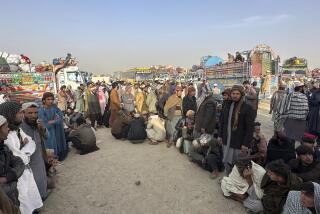Flogging Keeps Peace in Pakistan : Crime: The ancient, public Islamic punishment has settled hundreds of tribal disputes since its resurrection in the 1980s.
- Share via
BARA, Pakistan — In the tough tribal country around the fabled Khyber Pass, an Islamic holy man is imposing the ancient punishment of public flogging for modern crimes.
Because of Maulana Mohammed Mujahid, public flogging is the chosen punishment of more and more orthodox Islamic clerics in the region.
They are judge and jury in the Khyber Agency, the mountainous frontier with Afghanistan where tribal leaders rule by a centuries-old code and the arm of Pakistan’s civil law rarely enters. Islamabad, seat of the national government, is hundreds of miles south.
Foreigners need special permission to pass through heavily fortified checkpoints that dot the area.
Mujahid is a diminutive religious scholar with enormous influence. Fierce tribal lords bow to him when they arrive at his small, dried-mud house seeking arbitration of an intra-tribal dispute or prosecution of an enemy.
“Crimes were increasing day by day” in Bara, Mujahid said. His answer was to form a 40-member jirga , or council of Islamic clerics, nearly a year ago to curb the crime wave with the law of Islam.
Since then, at least 300 people have been flogged and hundreds of tribal disputes resolved.
Gen. Zia ul-Haq, Pakistan’s late military ruler, resurrected flogging in the mid-1980s to illustrate his commitment to Islamic law, but the floggings were neither widespread nor public.
At Bara, by contrast, thousands of people crowded an arid field one day to watch the beatings.
Bahadur Khan, an Afghan refugee convicted of rape, was given 100 lashes of a leather strap 2 inches wide. Doctors stopped the whipping periodically to check his condition. He was carried away at the end.
Mirza Khan, an 18-year-old Afghan refugee convicted of kidnaping, waited his turn huddled in a corner of his cell, a small, dingy room with mud floors and rusty bars. He was wrapped in a tattered blanket and glanced nervously at his guards.
“I’m very sad in here,” the young man said.
He shared the cell with seven other people, all sentenced to be flogged for crimes ranging from drug trafficking to kidnaping.
The Islamic clerics had found Khan guilty of conspiring to kidnap. His brother, accused of being the mastermind, escaped.
“I’m not a criminal,” he said. “I’m here for my brother. He fled.”
His jailer and Abdul Hamid Afridi, secretary general of the council, said he would get only five lashes.
About 3 million Afghan refugees live in Northwest Frontier province on the border with their country, which has been devastated by nearly 13 years of civil war.
Human rights activists condemn public flogging as inhuman and barbaric. Many Islamic scholars say the Koran, the Muslim holy book, intended flogging only as a form of humiliation and not severe punishment.
“Cruelty is not acceptable, but flogging is an Islamic punishment,” Mujahid said.
Reports of people being stoned to death for rape, punishment permitted by Islam, have filtered through to Peshawar, the nearest city, during the last year. None have been confirmed.
Orthodox Islamic clerics exert great pressure on the central government. Their small but powerful religious parties organize street demonstrations that have undermined civilian governments and forced the army to take over.
The clerics hounded former Prime Minister Benazir Bhutto during her 20 months in power. She was declared a heretic after saying it was barbaric to cut off the hands of convicted thieves.
Bhutto tried to appease fundamentalist critics by shrouding herself in a veil, fingering prayer beads and visiting Islamic shrines.
Nawaz Sharif, who became prime minister after last year’s election, promised to bring all Pakistan under Islamic law. Now he wants the many sects to reach consensus on a bill, and most analysts believe that is impossible.
Some of the more orthodox cabinet ministers have accused Sharif of moving too slowly and one of them resigned.
More to Read
Sign up for Essential California
The most important California stories and recommendations in your inbox every morning.
You may occasionally receive promotional content from the Los Angeles Times.













